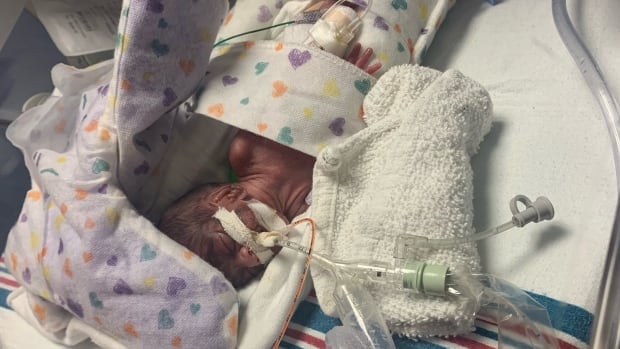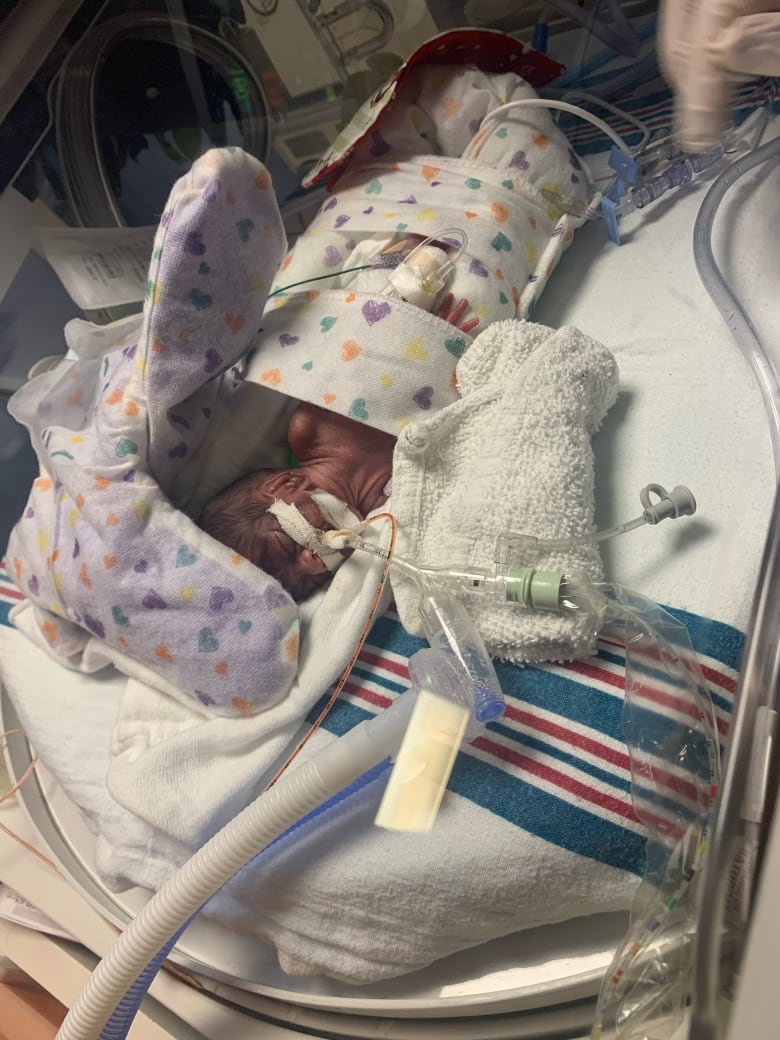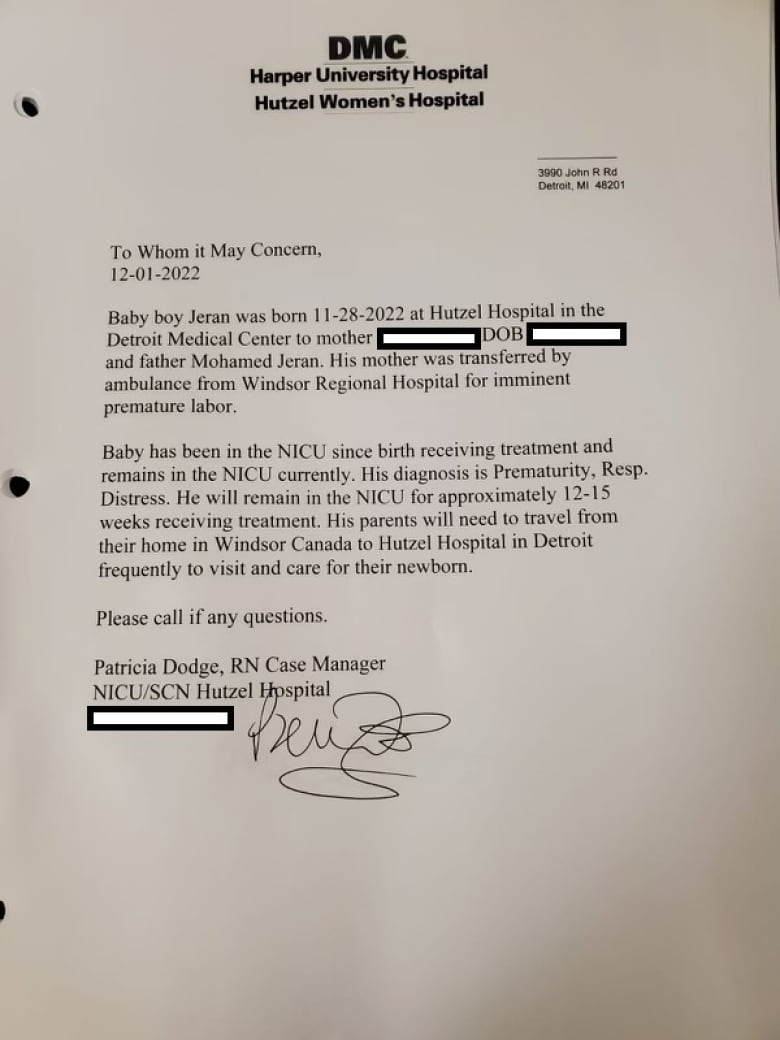
Weeks after Mohamed Jeran’s wife gave birth to their premature son in Detroit, the couple — who are living in Windsor, Ont., as refugees — have finally been allowed by Ottawa to more easily cross the border to see him at the hospital where he’s been since his birth.
The couple moved to Windsor from Yemen in 2018 and have three other children at home, including a toddler who is immunocompromised, said Jeran. He and his family have permanent residence (PR) status in Canada, and while the couple have been able to see the baby, it’s been difficult because they don’t have all their legal paperwork.
In late November, Jeran’s wife went into labour 23 weeks into her pregnancy. Jeran said doctors gave them the option of going to a Detroit or London, Ont., hospital for the delivery.
Going to the London hospital was considered a risk because it was farther from Windsor than Detroit.
“He [the doctor] did an ultrasound and then he said, ‘No, there is no way we can stop — the baby is coming,” said Jeran. “He said like, ‘I’m worried the delivery to happen in the ambulance, it’s going to be a risk for the baby and mom.'”
The ultrasound was done at Windsor Regional Hospital (WRH), which is designated by Ontario for infant deliveries of 26 weeks or later. Otherwise, pregnant individuals are sent to other hospitals. Other complications may also lead to a patient being transferred to another hospital, according to a statement from WRH.
Jeran and his wife decided Detroit was safer, and she was rushed by ambulance to Hutzel Women’s Hospital, across the Canada-U.S. border from Windsor. He said she underwent a caesarean section without him by her side because he wasn’t allowed to cross the border.
“So I spent all the night just on the phone, just hearing from far away — couldn’t do anything,” said the new dad, who didn’t want his wife’s first name reported.
Baby Moataz was born on Nov. 28. He has been in Hutzel Women’s Hospital’s neonatal unit for respiratory issues, according to a signed letter from the Detroit hospital, where the preemie is expected to stay for 12 to 15 weeks.

Jeran’s wife stayed in the hospital for fewer than five days with the baby because she doesn’t have the legal documents to remain in the U.S.
Difficulty crossing the border about to ease
Although Jeran and his wife have permanent residence status here, they didn’t have PR travel documents, which they would need to apply for a visa to enter the U.S. They also no longer have their passports from Yemen, which were held by the government during their PR application process and never returned.
Immigration lawyer Eddie Kadri, who did not work with the Jerans, said that in general, people without citizenship need a visa to enter the U.S., but officers at the border have the discretion to admit them on a “humanitarian parole.”
“I’ve heard many people that have had this happen to them,” said Kadri, adding it can occur in cases related to health or a dying family member, though it is unusual.

The hospital wrote a letter giving the details of the birth, something Jeran believes has helped him cross the border.
Jeran said he has been regularly calling Immigration, Refugees and Citizenship Canada (IRCC) every day for an update about his PR travel documents, but is often unable to get through to someone. When he does, he said, they do not do much for him.
Jeran said he was relieved after finding out last week his PR travel documents are on the way and he should receive them this week, so he can apply for a visa.
“[IRCC] called me and said your travel documents are on the way,” said Jeran.
“It was a bad headache and it is gone from my head.”
On Wednesday, Jeran said, the baby was doing well and his wife is happy about the paperwork coming through.
Immigration backlog impacting community: MP
The IRCC is dealing with an ongoing backlog of cases that has affected millions of people.
In a statement, the IRCC said it is “sensitive to the emotional stress that can be caused when there are issues with cases involving children.”
The IRCC said it is “committed to providing quality client service” and will “continue to improve our operations in order to provide fast and efficient service.”
NDP MP Brian Masse, who represents the riding of Windsor West and looked into the Jeran family’s case, blamed the federal government for not committing the proper resources.

“They closed the local immigration office to the public. That was a big mistake that was made from before, and people just don’t have the communication sets to be able to do all this online,” said Masse. “So all those things have been taking place and they’ve been opening up new streams of immigrants coming in without finishing the casework at the previous people.”
Masse said he gets about two dozen immigration inquiries each day at his office as part of the ongoing problem, which he said has become worse.
Kadri said the issue is ongoing and affecting every application.
“These delays are going to continue until these new hires that IRCC is rounding up and trying to train in a quick manner,” he said. “It’s really just impossible to hire new people and train them and get them up to speed.”